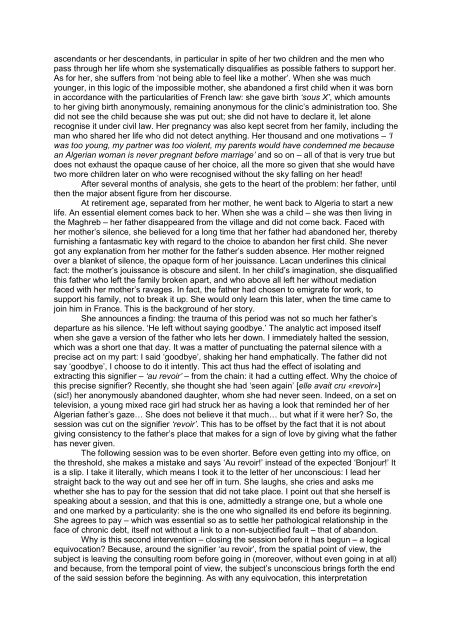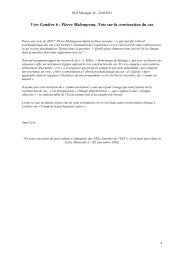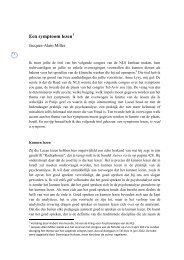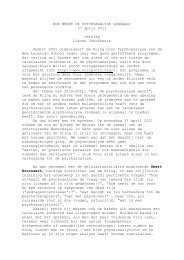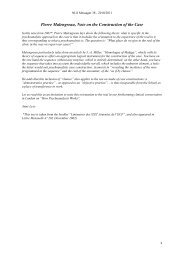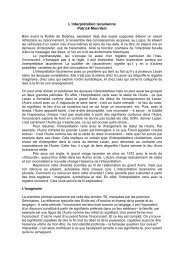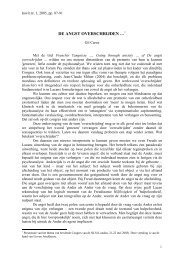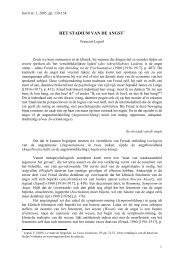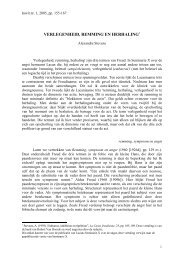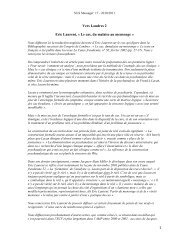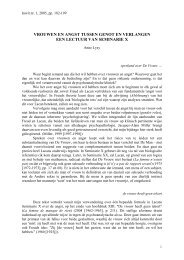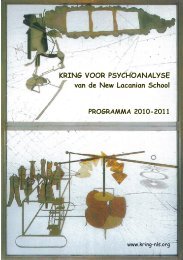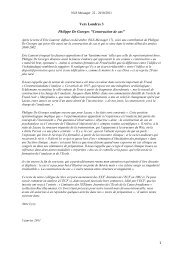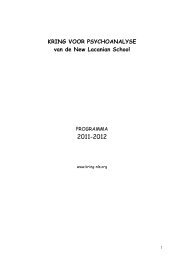Lacanian Interpretation Patrick Monribot - Psychoanalyse Lacan ...
Lacanian Interpretation Patrick Monribot - Psychoanalyse Lacan ...
Lacanian Interpretation Patrick Monribot - Psychoanalyse Lacan ...
Create successful ePaper yourself
Turn your PDF publications into a flip-book with our unique Google optimized e-Paper software.
ascendants or her descendants, in particular in spite of her two children and the men who<br />
pass through her life whom she systematically disqualifies as possible fathers to support her.<br />
As for her, she suffers from ‘not being able to feel like a mother’. When she was much<br />
younger, in this logic of the impossible mother, she abandoned a first child when it was born<br />
in accordance with the particularities of French law: she gave birth ‘sous X’, which amounts<br />
to her giving birth anonymously, remaining anonymous for the clinic’s administration too. She<br />
did not see the child because she was put out; she did not have to declare it, let alone<br />
recognise it under civil law. Her pregnancy was also kept secret from her family, including the<br />
man who shared her life who did not detect anything. Her thousand and one motivations – ‘I<br />
was too young, my partner was too violent, my parents would have condemned me because<br />
an Algerian woman is never pregnant before marriage’ and so on – all of that is very true but<br />
does not exhaust the opaque cause of her choice, all the more so given that she would have<br />
two more children later on who were recognised without the sky falling on her head!<br />
After several months of analysis, she gets to the heart of the problem: her father, until<br />
then the major absent figure from her discourse.<br />
At retirement age, separated from her mother, he went back to Algeria to start a new<br />
life. An essential element comes back to her. When she was a child – she was then living in<br />
the Maghreb – her father disappeared from the village and did not come back. Faced with<br />
her mother’s silence, she believed for a long time that her father had abandoned her, thereby<br />
furnishing a fantasmatic key with regard to the choice to abandon her first child. She never<br />
got any explanation from her mother for the father’s sudden absence. Her mother reigned<br />
over a blanket of silence, the opaque form of her jouissance. <strong>Lacan</strong> underlines this clinical<br />
fact: the mother’s jouissance is obscure and silent. In her child’s imagination, she disqualified<br />
this father who left the family broken apart, and who above all left her without mediation<br />
faced with her mother’s ravages. In fact, the father had chosen to emigrate for work, to<br />
support his family, not to break it up. She would only learn this later, when the time came to<br />
join him in France. This is the background of her story.<br />
She announces a finding: the trauma of this period was not so much her father’s<br />
departure as his silence. ‘He left without saying goodbye.’ The analytic act imposed itself<br />
when she gave a version of the father who lets her down. I immediately halted the session,<br />
which was a short one that day. It was a matter of punctuating the paternal silence with a<br />
precise act on my part: I said ‘goodbye’, shaking her hand emphatically. The father did not<br />
say ‘goodbye’, I choose to do it intently. This act thus had the effect of isolating and<br />
extracting this signifier – ‘au revoir’ – from the chain: it had a cutting effect. Why the choice of<br />
this precise signifier? Recently, she thought she had ‘seen again’ [elle avait cru «revoir»]<br />
(sic!) her anonymously abandoned daughter, whom she had never seen. Indeed, on a set on<br />
television, a young mixed race girl had struck her as having a look that reminded her of her<br />
Algerian father’s gaze… She does not believe it that much… but what if it were her? So, the<br />
session was cut on the signifier ‘revoir’. This has to be offset by the fact that it is not about<br />
giving consistency to the father’s place that makes for a sign of love by giving what the father<br />
has never given.<br />
The following session was to be even shorter. Before even getting into my office, on<br />
the threshold, she makes a mistake and says ‘Au revoir!’ instead of the expected ‘Bonjour!’ It<br />
is a slip. I take it literally, which means I took it to the letter of her unconscious: I lead her<br />
straight back to the way out and see her off in turn. She laughs, she cries and asks me<br />
whether she has to pay for the session that did not take place. I point out that she herself is<br />
speaking about a session, and that this is one, admittedly a strange one, but a whole one<br />
and one marked by a particularity: she is the one who signalled its end before its beginning.<br />
She agrees to pay – which was essential so as to settle her pathological relationship in the<br />
face of chronic debt, itself not without a link to a non-subjectified fault – that of abandon.<br />
Why is this second intervention – closing the session before it has begun – a logical<br />
equivocation? Because, around the signifier ‘au revoir’, from the spatial point of view, the<br />
subject is leaving the consulting room before going in (moreover, without even going in at all)<br />
and because, from the temporal point of view, the subject’s unconscious brings forth the end<br />
of the said session before the beginning. As with any equivocation, this interpretation


